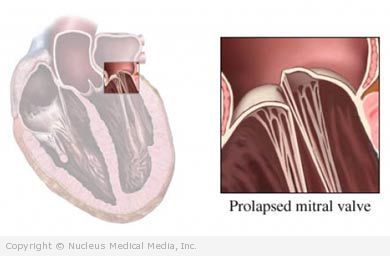Mitral valve prolapse
(MVP; Floppy Valve Syndrome; Barlow’s Syndrome; Click-Murmur Syndrome)
Mitral valve prolapse – Definition
Mitral valve prolapse (MVP) is a common, usually benign heart disorder. The mitral valve controls blood flow between the upper (atrium) and lower (ventricle) chambers on the left side of the heart. Normally, blood should only flow in one direction, from the upper chamber into the lower chamber. In MVP, the valve flaps don’t work properly; part of the valve balloons into the atrium, which may be associated with blood flowing in the wrong direction, or leaking back into the atrium.
Mitral valve prolapse – Causes
In most cases, the cause of MVP is unknown. In some cases, it appears to be an inherited genetic condition. Rarely, MVP may be caused by:
- Rheumatic fever
- Coronary heart disease
- Cardiomyopathy
- Atrial septal defects
Mitral valve prolapse – Risk Factors
A risk factor is something that increases your chance of getting a disease or condition:
- Family history of mitral valve prolapse
- Sex: female
- Age: 14 to 30
- Scoliosis
- Thin chest diameter
- Low body weight
- Low blood pressure
- Chest wall deformities
- Marfan syndrome
- Grave’s disease
Mitral valve prolapse – Symptoms
People with mitral valve prolapse often have no symptoms at all. If symptoms do occur, however, they may include one or more of the following:
- Irregular heart beat
- Fatigue
- Chest pain
- Panic attacks or anxiety
- Rapid heartbeat (palpitations)
- Sensation of missed heartbeats
- Shortness of breath
- Dizziness
- Intestinal problems (such as irritable bowel syndrome)
Mitral valve prolapse – Diagnosis
Mitral valve prolapse can be heard through a stethoscope. A small blood leakage will sound like a murmur. When the mitral valve balloons backward, it may produce a clicking sound. Both murmurs and clicks are telltale signs of MVP. An echocardiogram can confirm the diagnosis. You may also be asked to wear a Holter monitor for a day or two to record the electrical activity of your heart continuously (EKG).
Mitral valve prolapse – Treatment
In most cases, no treatment is necessary. Although no longer routinely recommended, you may need to take antibiotics prior to some dental and medical procedures. This is to prevent infections. Ask your doctor if you will need to take antibiotics.
If symptoms include chest pain, anxiety, or panic attacks, a beta-blocker medication can be prescribed. Ask your doctor whether you may continue to participate in your usual athletic activities.
In very rare cases, the blood leakage may become severe. In these few cases, the mitral valve may need to be surgically repaired or replaced.
Mitral valve prolapse – Prevention
There are no guidelines for preventing MVP of unknown or genetic origin.
You may be able to prevent symptoms, however, through certain lifestyle changes:
- Limit your intake of caffeine.
- Avoid medications (such as decongestants) that speed up your heart rate.
- Exercise regularly, following your doctor’s recommendations.

